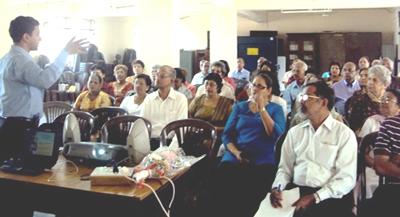ARE YOU AN OSTRICH?
November is National Alzheimer’s Disease Awareness Month and it deserves attention from you. According to the Alzheimer’s Association report Changing the Trajectory of Alzheimer’s Disease, “The number of Americans age 65 and older who have this condition will increase from 5.1 million today to 13.5 million by mid-century.”
The impact of this information on healthcare, senior care and the family unit is going to be devastating. Figuring out medical options, residential situations and financial resources are just a few areas which will be impacted greatly. As the research continues to try to find a cure for this dreadful disease, you must get informed.
From personal experience, we know that seniors do not want to inform family when they are having problems with household management, paying bills or preparing meals. They do not want to admit when they get lost returning home from church or the grocery store. Seniors want to maintain their independence and not worry their children. This is reasonable but not practical.
 The practical side of the situation is that when there are obvious changes in behaviors or routines, strategies can be put into place to fix the situation. Family members or professional caregivers can plan, purchase, prepare and serve meals daily. An approved designee can pay bills or automatic drafts can be set up easily. Homes can have simple handrails and shower seats installed or retrofitted for entire handicapped accessible bathrooms. Safety measures can be implemented such as removing throw rugs, purchasing alert buttons, installing extra locks on doors to prevent wandering and locking away dangerous items. These are a few ideas, but the key is to know what needs attention.
The practical side of the situation is that when there are obvious changes in behaviors or routines, strategies can be put into place to fix the situation. Family members or professional caregivers can plan, purchase, prepare and serve meals daily. An approved designee can pay bills or automatic drafts can be set up easily. Homes can have simple handrails and shower seats installed or retrofitted for entire handicapped accessible bathrooms. Safety measures can be implemented such as removing throw rugs, purchasing alert buttons, installing extra locks on doors to prevent wandering and locking away dangerous items. These are a few ideas, but the key is to know what needs attention.
Often a senior will explain away why things are happening … just an accident, the bill got stuffed away in old papers or the peas burned because she just didn’t put enough water in them. The senior might say they planned to go a different way home than the usual route to cover up getting confused on the directions. When visits are short, explanations might continue to work. However, with an extended visit the symptoms become more evident to indicate the senior needs more help.
Get informed. Know the symptoms for the onset of dementia, of which Alzheimer’s is the most prevalent.
Research has shown the starting certain medications can slow the progression of the disease. Waiting is the wrong path to choose. Discuss it with your primary Physician. Consider seeking further testing.
Our title, Are you an Ostrich? is simply to encourage you to Take your head out of the sand and know that you will have a family member, neighbor or close friend who will develop Alzheimer ’s disease, if you haven’t already.
Become informed by reading materials available on the internet, at bookstores or in the library. Attend seminars in the community. Contact your local Area on Aging for upcoming events which might be helpful for you.
Getting ready now will empower you to act appropriately when necessary.
Photo: Become informed by reading materials available on the internet, at bookstores or in the library. Attend seminars in the community. Contact your local Area on Aging for upcoming events which might be helpful for you.

 How to resolve AdBlock issue?
How to resolve AdBlock issue? 








